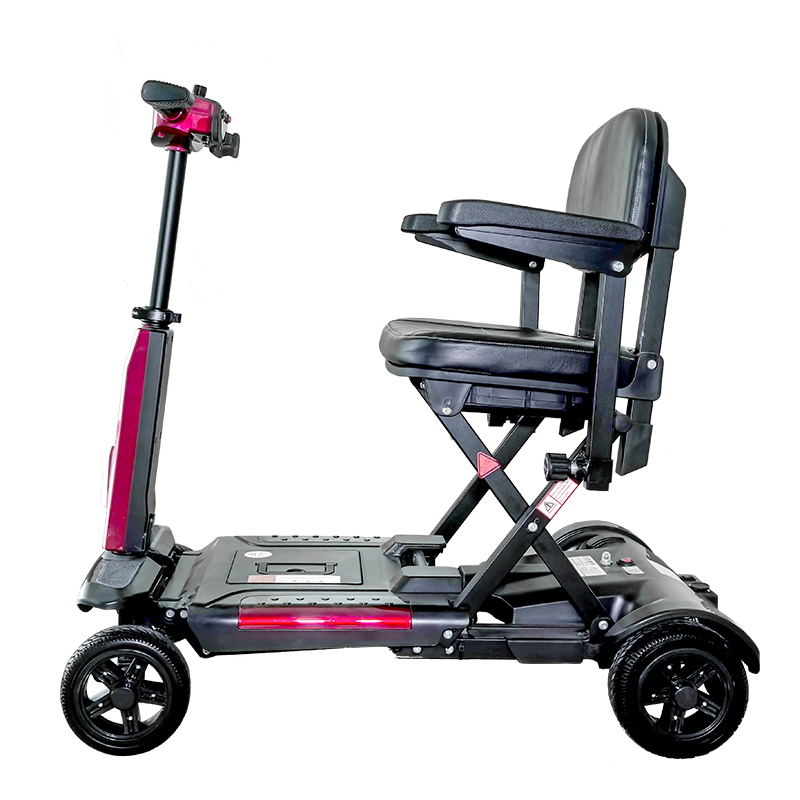When discussing mobility aids, particularly those designed for individuals with physical impairments, the term "wheelchair scooter" often arises. These devices, integral in providing mobility and independence to users, come in various forms and names. In this article, we will explore what wheelchair scooters are called, examining the different types, terminologies, and the market landscape involving manufacturers and suppliers.
Introduction to Wheelchair Scooters
● Purpose and Benefits of Wheelchair Scooters
Wheelchair scooters, often referred to as mobility scooters, serve as electric personal transporters for individuals who may have difficulty walking or standing for extended periods. Unlike traditional wheelchairs, these scooters offer a more versatile and customizable solution for mobility, providing users with the ability to traverse both indoor and outdoor terrains. They are particularly beneficial for individuals with systemic or whole-body disabling conditions, allowing them to maintain their independence and engage in daily activities with ease.
Common Names for Wheelchair Scooters
● Variations in Terminology
The terminology surrounding wheelchair scooters can vary significantly, influenced by the features and functionalities they offer. Common names include "mobility scooter," "electric scooter," and "powered scooter." These terms are often used interchangeably, though subtle differences in design and application may lead to preference for one term over another. For instance, "electric scooter" generally refers to the motorized versions, emphasizing their power source, while "mobility scooter" is a broader term encompassing various designs and purposes.
● Popular Names and Their Origins
Many terms originate from the commercial branding and marketing strategies of manufacturers and suppliers. Brands often label their products with names that highlight their unique features, such as "foldable scooter" or "travel scooter," to appeal to specific consumer needs. Understanding these names is crucial for consumers seeking the right device to match their mobility requirements.
Types of Wheelchair Scooters Available
● Differentiating Between Travel, Portable, and Four-Wheel Scooters
Several types of wheelchair scooters are available on the market, each suited for different environments and user needs. Travel scooters are typically lightweight and compact, designed for easy transport and assembly. Portable scooters offer similar benefits but may include more features for user comfort. Four-wheel scooters, on the other hand, provide increased stability and are better suited for rugged outdoor use.
● Features That Distinguish Each Type
The distinguishing features of each type include the number of wheels, weight capacity, and ease of disassembly. For instance, three-wheel scooters are known for their superior maneuverability, making them ideal for indoor use, whereas four-wheel scooters offer greater stability for outdoor terrains. Understanding these features is essential for users when comparing options from wholesale wheelchair scooter suppliers and manufacturers.
Travel and Portable Scooter Features
● Key Characteristics of Travel Scooters
Travel scooters are designed for convenience and portability. They are typically lightweight and can be easily disassembled into several pieces, making them perfect for users who frequently travel. These scooters are favored by individuals who require a mobility aid that can be effortlessly transported in a vehicle or taken onto an airplane.
● Benefits of Portability for Users
The portability of these scooters provides users with the freedom to explore new places without the constraints of a bulky mobility device. This is particularly beneficial for those who travel frequently or participate in activities outside the home. Furthermore, the convenience of portable scooters often makes them a preferred choice among users seeking products from reputable wheelchair scooter factories and suppliers.
Understanding Four-Wheel Scooters
● Stability and Performance Advantages
Four-wheel scooters are known for their enhanced stability and robust performance on uneven surfaces. They are designed to handle a variety of terrains, making them ideal for outdoor use. The additional wheel provides a balance that reduces the risk of tipping, a critical safety feature for many users.
● Typical Uses and User Demographics
Such scooters are commonly used by individuals who require a durable and reliable mobility solution for navigating parks, trails, and other outdoor settings. They tend to appeal to users who prioritize stability over maneuverability, often featuring larger motors and batteries for extended range. Wheelchair scooter manufacturers often cater to this market segment by offering heavy-duty models with advanced suspension systems.
Regulatory Terminology and Standards
● How Regulations Influence Scooter Naming
Regulatory standards play a significant role in the terminology used for wheelchair scooters. Terms such as "Class 2 Invalid Carriage" or "Class 3 Mobility Scooter" arise from legal classifications, each with specific requirements regarding speed, design, and usage. These classifications influence both the naming and design of the scooters, ensuring compliance with safety and performance criteria.
● Understanding Compliance and Safety Standards
Understanding these standards is crucial for consumers to ensure that their scooter is legal for use in their area. Compliance with regulations is often a key consideration for wheelchair scooter suppliers, who must ensure that their products meet the necessary safety and accessibility standards to be marketable in different regions.
User Preferences and Naming Trends
● How Users Refer to Their Scooters
User preferences often dictate the colloquial names for their mobility devices. While technical terms may describe the specific features of a scooter, users tend to favor names that reflect their personal experiences and needs. This can lead to a diverse range of names used in everyday conversation, influenced by factors such as convenience, familiarity, and cultural context.
● Trends in Naming Based on User Needs
Trends in naming often reflect broader changes in user demographics and technology. For example, as scooters become more advanced and feature-rich, names that highlight these advancements become more prevalent. This trend is also influenced by the growing market for personalized and customizable mobility aids from wheelchair scooter suppliers and manufacturers.
Regional Variations in Naming
● Differences in Terminology Across Countries
Regional differences can have a significant impact on the terminology used for wheelchair scooters. In some countries, regulatory classifications dictate the names, while in others, cultural preferences and language play a more significant role. These variations can be observed in both product marketing and consumer language.
● Cultural Influences on Naming Conventions
Cultural factors, including language and local customs, also shape the naming conventions for mobility scooters. In some regions, terms like "invalid carriage" may still be used, while in others, more modern and inclusive language is preferred. Recognizing these cultural differences is important for manufacturers and suppliers operating in a global market.
Conclusion: Choosing the Right Scooter
● Considerations When Selecting a Wheelchair Scooter
Selecting the right wheelchair scooter involves balancing various factors, including the user's mobility needs, lifestyle, and personal preferences. Understanding the differences between scooter types, features, and terminologies is crucial for making an informed decision. It is also important to consider the reputation of the wheelchair scooter supplier and the quality of after-sales support offered.
● Naming as a Factor in Purchase Decisions
While the name of a scooter may not be the primary consideration, it can influence perceptions of its functionality and suitability. Users often gravitate towards names that resonate with their needs or suggest reliability and quality. As such, manufacturers and suppliers must carefully consider naming strategies in their marketing efforts.
Introducing Excellent: A Leader in Mobility Solutions
Suqian Excellent Science And Technology Co., Ltd. stands as a leading manufacturer of rehabilitation therapy supplies, including wheelchair scooters. Located in Shuyang National Economic and Technological Development Zone, Suqian City, Jiangsu Province, the brand "EXCELLENT" embodies their commitment to quality and customer satisfaction. Their extensive product range includes wheelchairs, mobility scooters, and more, with a focus on innovative design and customized solutions. Certified by CE, FDA, SGS, and ISO9001, EXCELLENT has earned praise from distributors worldwide, underscoring their reputation for excellence in the healthcare industry.

Post time: 2025-03-07 15:36:04

.png)





































